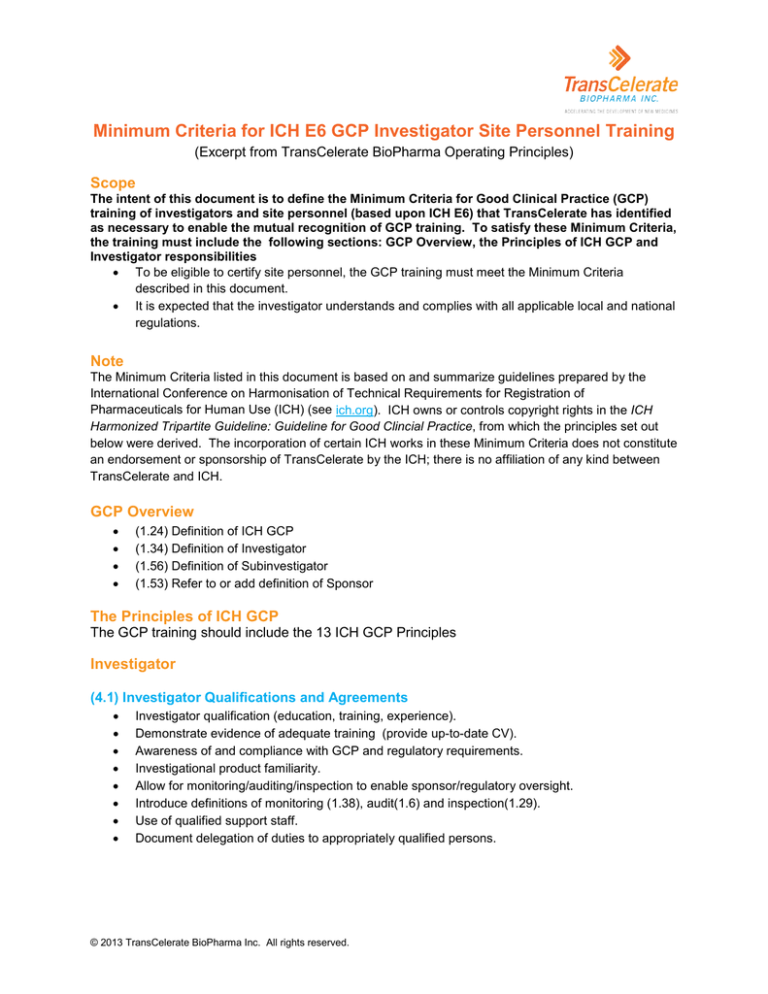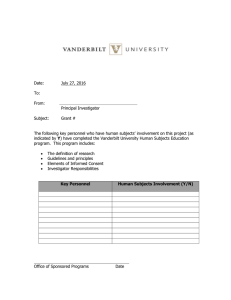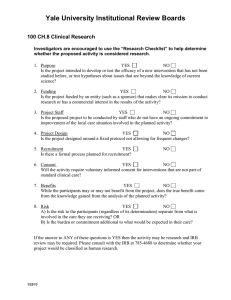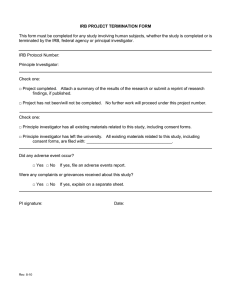
Minimum Criteria for ICH E6 GCP Investigator Site Personnel Training
(Excerpt from TransCelerate BioPharma Operating Principles)
Scope
The intent of this document is to define the Minimum Criteria for Good Clinical Practice (GCP)
training of investigators and site personnel (based upon ICH E6) that TransCelerate has identified
as necessary to enable the mutual recognition of GCP training. To satisfy these Minimum Criteria,
the training must include the following sections: GCP Overview, the Principles of ICH GCP and
Investigator responsibilities
• To be eligible to certify site personnel, the GCP training must meet the Minimum Criteria
described in this document.
• It is expected that the investigator understands and complies with all applicable local and national
regulations.
Note
The Minimum Criteria listed in this document is based on and summarize guidelines prepared by the
International Conference on Harmonisation of Technical Requirements for Registration of
Pharmaceuticals for Human Use (ICH) (see ich.org). ICH owns or controls copyright rights in the ICH
Harmonized Tripartite Guideline: Guideline for Good Clincial Practice, from which the principles set out
below were derived. The incorporation of certain ICH works in these Minimum Criteria does not constitute
an endorsement or sponsorship of TransCelerate by the ICH; there is no affiliation of any kind between
TransCelerate and ICH.
GCP Overview
•
•
•
•
(1.24) Definition of ICH GCP
(1.34) Definition of Investigator
(1.56) Definition of Subinvestigator
(1.53) Refer to or add definition of Sponsor
The Principles of ICH GCP
The GCP training should include the 13 ICH GCP Principles
Investigator
(4.1) Investigator Qualifications and Agreements
•
•
•
•
•
•
•
•
Investigator qualification (education, training, experience).
Demonstrate evidence of adequate training (provide up-to-date CV).
Awareness of and compliance with GCP and regulatory requirements.
Investigational product familiarity.
Allow for monitoring/auditing/inspection to enable sponsor/regulatory oversight.
Introduce definitions of monitoring (1.38), audit(1.6) and inspection(1.29).
Use of qualified support staff.
Document delegation of duties to appropriately qualified persons.
© 2013 TransCelerate BioPharma Inc. All rights reserved.
(4.2) Adequate Resources
•
•
•
•
Potential to recruit suitable subjects.
Sufficient time to conduct trial.
Sufficient qualified staff and adequate facilities to conduct trial.
Staff are adequately informed about protocol, IP and tasks related to the protocol.
(4.3) Medical Care of Trial Subjects
•
•
•
•
Qualified physician or dentist who is an investigator or sub-investigator should be
responsible for all trial related medical decisions.
During and following the trial, the investigator/institution should ensure appropriate medical care
for AEs and clinically significant lab deviations related to trial and inform subjects if medical care
is needed for intercurrent illness.
Inform primary (family) physician of subject’s participation in trial (after obtaining
permission from the subject).
Physician to make a reasonable effort to ascertain the reasons for subject’s premature withdrawal
from the trial.
(4.4) Communication with IRB/IEC
•
•
•
•
Definition of IRB (1.31) & IEC (1.27).
Before trial begins, obtain written, dated approval/ favourable opinion for protocol and all
documents provided to subjects (e.g. ICF, advertisements).
Provide a copy of Investigator’s Brochure/updated IB.
Before and during the trial, provide all documents required by IRB/IEC for review and appropriate
approval/ favourable opinion.
(4.5) Compliance with Protocol
•
•
•
Conduct trial according to approved protocol, GCP and applicable regulatory requirements e.g.
sufficient documentation to support subject meeting inclusion/exclusion criteria.
Document the acceptance to follow protocol in a protocol signature page or contract.
Protocol deviation process - no deviations or changes prior to sponsor and IRB/IEC approval/
favourable opinion.
– Exception: Deviation necessary to eliminate immediate hazard to trial subject
Deviations need to be documented and rationale submitted to sponsor, IRB/IEC
and regulatory authorities.
– Exception: If changes are minor logistical or administrative (e.g. contact details) then
deviations are documented and explained.
(4.6) Investigational Products
•
•
•
•
•
Responsibility for IP (Investigational Product refer to 1.33) accountability & delegation of activities
and supervision of an appropriately qualified person.
Documentation of delivery, inventory, dispensation, usage , disposal or return and reconciliation
of all IP and other study medication.
Stored per requirements
IP usage per protocol
Explanation of correct use of IP to subjects and periodic check for understanding/compliance.
Minimum Criteria for ICH E6 GCP Investigator Site Personnel Training
(Excerpt from TransCelerate BioPharma Operating Principles)
Version 1.1: February 7, 2013
© 2013 TransCelerate BioPharma Inc. All rights reserved.
2
(4.7) Randomization Procedures and Unblinding
•
•
Follow the trial’s randomization procedures.
Blinded trials: Promptly document and report to sponsor any premature unblinding.
(4.8) Informed Consent of Trial Subjects
•
•
Definition of Informed Consent (1.28).
Explain the informed consent process & informed consent form (ICF):
– IRB/IEC written approval in advance of use for written consent and other written
information to be provided to subjects.
– Subject to be fully informed of all pertinent aspects of the trial prior to participation.
– The informed consent discussion and form needs to include all relevant explanations.
Refer or link to ICH 4.8.10.
– Language used in oral and written information (ICF) should be understandable to subject
or legal representative and impartial witness (where applicable).
– Subject should have ample time to review the ICF and to ask any questions and receive
answers before decision is made.
– Subject should not be unduly influenced to participate.
– ICF should be obtained/signed prior to a subject’s participation in a trial (before any study
procedures are performed).
– Subject should be aware that withdrawal is possible at any time.
– Subject should not be asked to waive legal rights or release investigator or sponsor from
liability for negligence.
– Written informed consent form must be updated/approved when new information is
available that may be relevant to subject’s consent.
•
•
Informed consent of special population:
Refer to or add definition of Vulnerable Subjects (1.61)
– When a subject (e.g. minor, incapacitated) can only be enrolled with the consent of the
legal representative, the subject must be informed to the level of their understanding,
provide assent (where this is feasable) and personally sign and date the consent form.
– In emergency situations where the subject and legal representative are unable to
consent, enrollment requires protective measures to be described in protocol or other
IRB/IEC approved documents. Subject or legal representative should be informed as
soon as possible and consent to continue and other consent as appropriate.
– If the subject/legal representative are unable to read, an impartial witness must be
present during the consent discussion and sign and date the consent form.
•
Informed Consent documentation:
– The ICF should be signed and personally dated by the subject and/or the legal
representative and by the person who conducted the consent.
– A signed & dated copy of the ICF should be given to the subject or the legal
representative (including any other written information provided to the subject).
– The Informed Consent process should be documented in the medical record/source file
(as well as documentation regarding communication of new information).
Minimum Criteria for ICH E6 GCP Investigator Site Personnel Training
(Excerpt from TransCelerate BioPharma Operating Principles)
Version 1.1: February 7, 2013
© 2013 TransCelerate BioPharma Inc. All rights reserved.
3
(4.9) Records and Reports
•
•
•
•
•
•
•
•
•
Definition of Source Documents: The actual documents (originals) GCP glossary 1.52(brief).
Refer to or add definition of Source Data (1.51)
Definition of Essential Documents (section 8)
The need to maintain essential documents. Refer/link to section 8.
Retention of essential documents.
CRFs and all required reports (written or electronic)
– Accuracy, legibility, completeness of data
– Data to be consistent with source data
Corrections are dated & initialed, do not obscure original entry and explained if necessary
(applies to written and electronic changes/updates). Retain records of changes and corrections.
Financial aspects documented in an agreement between sponsor and investigator/institution
Direct access to all trial-related documents by the monitor, the auditor, the IRB/IEC or regulatory
authority.
(4.10/4.13) Progress Reporting/ Final Reports
•
•
•
•
Investigator submits written summaries of progress to IRB/IEC at least annually or as required.
Provide written reports to sponsor and IRB/IEC (and institution where required) of any significant
changes affecting the study or increased risk to subjects.
Upon completion of trial, provide sponsor with all required reports.
Final report with a summary of trials & outcomes submitted to IRB/IEC and regulatory authorities
as required.
(4.11) Safety Reporting
•
•
•
•
•
Adverse Event (AE) definition (1.2).
Refer to or add definition of ADR (1.1) and Unexpected ADR (1.60).
AE Reporting
– All adverse events (AE) and/or laboratory abnormalities should be reported to the
sponsor within the time period defined in protocol.
Definition of a SAE (1.50).
All serious adverse events (SAEs) should be reported immediately to the sponsor except for
those SAEs that the protocol or other document (e.g. Investigator’s Brochure) identifies as not
needing immediate reporting .
– Prompt follow up by detailed written reports.
– Subjects should be identified by unique code numbers.
– Report unexpected serious drug reactions according to regulatory and IRB/IEC
requirements.
– Sponsor and IRB/IEC may need additional information for reported deaths (e.g. autopsy
report).
(4.12) Premature Termination or Suspension of Trial
•
•
Responsibility to promptly inform the trial subjects and ensure appropriate therapy and follow-up.
Inform regulatory authorities when required.
Responsibility for communication of study termination or suspension of study to sponsor, IRB/IEC
and institution as applicable, including a detailed written explanation.
Minimum Criteria for ICH E6 GCP Investigator Site Personnel Training
(Excerpt from TransCelerate BioPharma Operating Principles)
Version 1.1: February 7, 2013
© 2013 TransCelerate BioPharma Inc. All rights reserved.
4




